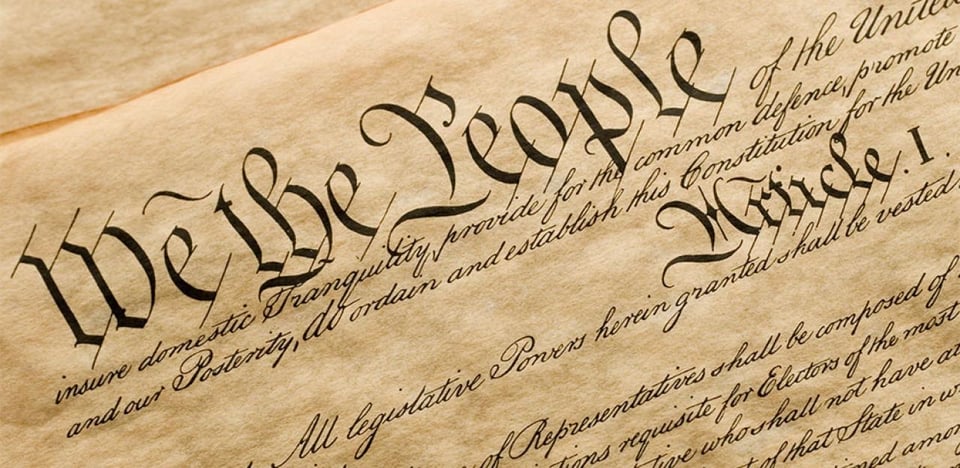The United States Constitution: Created Flawed Due To American Exceptionalism?
“To live under the American Constitution is the greatest political privilege that was ever accorded to the human race.” — Calvin Coolidge, 30th president of the United States

In the original version of the United States Constitution, as used for the first four presidential elections, the candidate who got the most votes in the Electoral College became the president, while the candidate who got the second most votes became the Vice President.
I’ll say that again. The guy who won the election became president, and the guy who lost it became his vice-president.
Thus, having had an independent — George Washington — win the first two, largely uncontested, elections, the third election in 1796 saw the Federalist Party defeat the Democratic-Republicans, with the Federalist’s John Adams becoming president and the Democratic-Republican’s losing candidate, Thomas Jefferson, becoming Vice-President.
After a similar situation occurred in 1800, the constitution was patched, I mean amended, by the Twelfth Amendment, which created the current system where a joint ticket runs as a pair for both positions.
Clearly, the people who wrote the constitution hadn’t foreseen the emergence of political parties. But was this emergence something they couldn’t have been expected to have foreseen, or something that was so blindingly, obviously, always going to happen that their failure to see it coming makes them look naive at best, and stupid at worst?
Well let’s look at the evidence. Firstly, it wasn’t as though these American political parties took decades to emerge. The first presidential election under the constitution was in 1788, the Federalist Party was founded in 1789, and the Democratic-Republic Party was formed in 1792. So the United States had political parties pretty much right from the start.
But there’s more. Let’s look at the country they had just separated from, Great Britain, and the leaders it had had, starting with the first ever Prime Minister, Robert Walpole, and running up to the period when the US constitution was written.
Prime Minister | In Office | Political Party |
|---|---|---|
Robert Walpole | 1721-1742 | Whig |
Spencer Compton, 1st Earl of Wilmington | 1742-1743 | Whig |
Henry Pelham | 1743-1754 | Whig |
Thomas Pelham-Holles, 1st Duke of Newcastle | 1757-1762 | Whig |
John Stuart, 3rd Earl of Bute | 1762-1763 | Tory |
George Grenville | 1763-1765 | Whig |
Charles Watson-Wentworth, 2nd Marquess of Rockingham | 1765-1766 | Whig |
William Pitt, 1st Earl of Chatham | 1766-1768 | Whig |
Augustus FitzRoy, 3rd Duke of Grafton | 1768-1770 | Whig |
Frederick North, Lord North | 1770-1782 | Tory |
Charles Watson-Wentworth, 2nd Marquess of Rockingham | 1782-1782 | Whig |
William Petty, 2nd Earl of Shelburne | 1782-1783 | Whig |
William Cavendish-Bentinck, 3rd Duke of Portland | 1783-1783 | Whig |
William Pitt the Younger | 1783-1801 | Tory |
As can be seen, for more than sixty years, British political leadership had been shared and swapped between two political factions that, while they might not have been political parties in the sense we’d understand them today, were still very much not a system comprised entirely of independents. (And the two parties had roots stretching back into the 1680s, some hundred years prior to the writing of the US constitution).
So given all of that, how in the name of all that’s holy did it not occur to the writers of the United States constitution that their politics, once shorn of the shackles of creating a new nation might, similarly, develop political factions?
I can’t help but wonder if this was American Exceptionalism at work. Did they think that sure, the duplicitous and corrupt British with their grubby system of acquiring a prime minister through backroom deals in smoke-filled rooms might have developed political parties, but they Americans were a more noble people living in the shining city on the hill, who were above such mundane things?
Now you might say, what does it matter, given that they fixed the problem back in 1803? I’d say the problem is that this might not be the only flaw introduced by not foreseeing the emergence of political parties.
Consider the existence of an incredibly powerful, executive head-of-state whose powers are supposedly balanced by the fact that they can be tried for crimes in a “court” where the House of Representatives serves as prosecutors and the Senate acts as the jury. When the Senate was foreseen to be a set of independent representatives, each of whom would have no particular link to the president being tried, that might have seemed a reasonable check.
But when the Senate consists of two political parties, with the president being a member of one of those parties?
Maybe not so much.